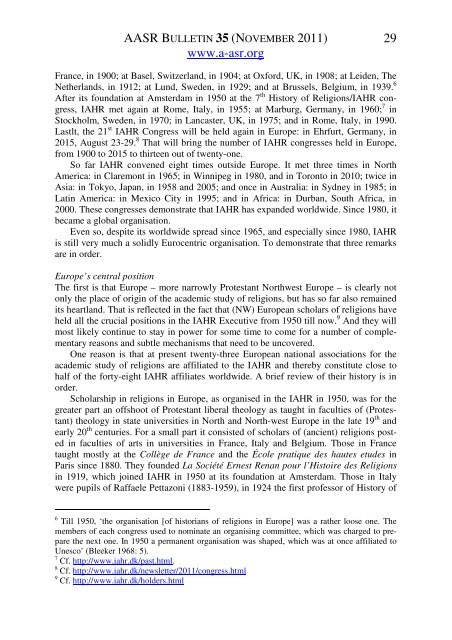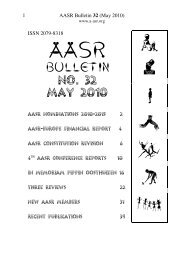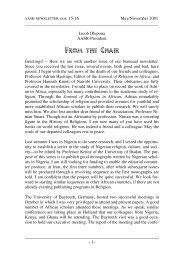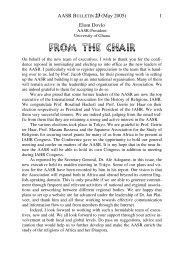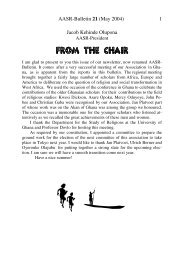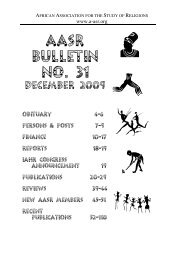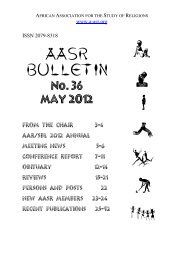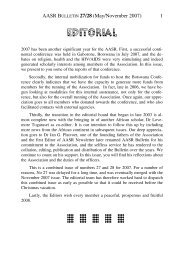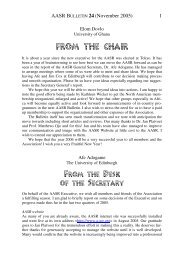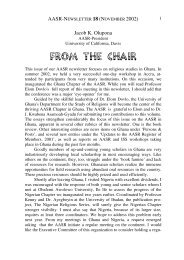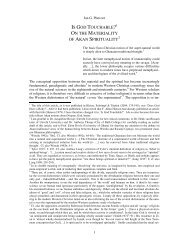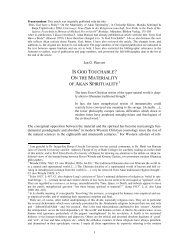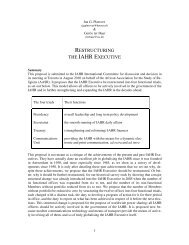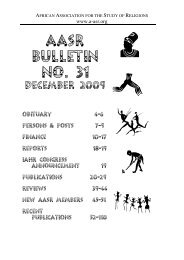AASR Bulletin 35 - The African Association for the Study of Religions
AASR Bulletin 35 - The African Association for the Study of Religions
AASR Bulletin 35 - The African Association for the Study of Religions
You also want an ePaper? Increase the reach of your titles
YUMPU automatically turns print PDFs into web optimized ePapers that Google loves.
<strong>AASR</strong> BULLETIN <strong>35</strong> (NOVEMBER 2011)<br />
www.a-asr.org<br />
29<br />
France, in 1900; at Basel, Switzerland, in 1904; at Ox<strong>for</strong>d, UK, in 1908; at Leiden, <strong>The</strong><br />
Ne<strong>the</strong>rlands, in 1912; at Lund, Sweden, in 1929; and at Brussels, Belgium, in 1939. 6<br />
After its foundation at Amsterdam in 1950 at <strong>the</strong> 7 th History <strong>of</strong> <strong>Religions</strong>/IAHR congress,<br />
IAHR met again at Rome, Italy, in 1955; at Marburg, Germany, in 1960; 7 in<br />
Stockholm, Sweden, in 1970; in Lancaster, UK, in 1975; and in Rome, Italy, in 1990.<br />
Lastlt, <strong>the</strong> 21 st IAHR Congress will be held again in Europe: in Ehrfurt, Germany, in<br />
2015, August 23-29. 8 That will bring <strong>the</strong> number <strong>of</strong> IAHR congresses held in Europe,<br />
from 1900 to 2015 to thirteen out <strong>of</strong> twenty-one.<br />
So far IAHR convened eight times outside Europe. It met three times in North<br />
America: in Claremont in 1965; in Winnipeg in 1980, and in Toronto in 2010; twice in<br />
Asia: in Tokyo, Japan, in 1958 and 2005; and once in Australia: in Sydney in 1985; in<br />
Latin America: in Mexico City in 1995; and in Africa: in Durban, South Africa, in<br />
2000. <strong>The</strong>se congresses demonstrate that IAHR has expanded worldwide. Since 1980, it<br />
became a global organisation.<br />
Even so, despite its worldwide spread since 1965, and especially since 1980, IAHR<br />
is still very much a solidly Eurocentric organisation. To demonstrate that three remarks<br />
are in order.<br />
Europe’s central position<br />
<strong>The</strong> first is that Europe – more narrowly Protestant Northwest Europe – is clearly not<br />
only <strong>the</strong> place <strong>of</strong> origin <strong>of</strong> <strong>the</strong> academic study <strong>of</strong> religions, but has so far also remained<br />
its heartland. That is reflected in <strong>the</strong> fact that (NW) European scholars <strong>of</strong> religions have<br />
held all <strong>the</strong> crucial positions in <strong>the</strong> IAHR Executive from 1950 till now. 9 And <strong>the</strong>y will<br />
most likely continue to stay in power <strong>for</strong> some time to come <strong>for</strong> a number <strong>of</strong> complementary<br />
reasons and subtle mechanisms that need to be uncovered.<br />
One reason is that at present twenty-three European national associations <strong>for</strong> <strong>the</strong><br />
academic study <strong>of</strong> religions are affiliated to <strong>the</strong> IAHR and <strong>the</strong>reby constitute close to<br />
half <strong>of</strong> <strong>the</strong> <strong>for</strong>ty-eight IAHR affiliates worldwide. A brief review <strong>of</strong> <strong>the</strong>ir history is in<br />
order.<br />
Scholarship in religions in Europe, as organised in <strong>the</strong> IAHR in 1950, was <strong>for</strong> <strong>the</strong><br />
greater part an <strong>of</strong>fshoot <strong>of</strong> Protestant liberal <strong>the</strong>ology as taught in faculties <strong>of</strong> (Protestant)<br />
<strong>the</strong>ology in state universities in North and North-west Europe in <strong>the</strong> late 19 th and<br />
early 20 th centuries. For a small part it consisted <strong>of</strong> scholars <strong>of</strong> (ancient) religions posted<br />
in faculties <strong>of</strong> arts in universities in France, Italy and Belgium. Those in France<br />
taught mostly at <strong>the</strong> Collège de France and <strong>the</strong> École pratique des hautes etudes in<br />
Paris since 1880. <strong>The</strong>y founded La Société Ernest Renan pour l’Histoire des <strong>Religions</strong><br />
in 1919, which joined IAHR in 1950 at its foundation at Amsterdam. Those in Italy<br />
were pupils <strong>of</strong> Raffaele Pettazoni (1883-1959), in 1924 <strong>the</strong> first pr<strong>of</strong>essor <strong>of</strong> History <strong>of</strong><br />
6 Till 1950, ‘<strong>the</strong> organisation [<strong>of</strong> historians <strong>of</strong> religions in Europe] was a ra<strong>the</strong>r loose one. <strong>The</strong><br />
members <strong>of</strong> each congress used to nominate an organising committee, which was charged to prepare<br />
<strong>the</strong> next one. In 1950 a permanent organisation was shaped, which was at once affiliated to<br />
Unesco’ (Bleeker 1968: 5).<br />
7 Cf. http://www.iahr.dk/past.html.<br />
8 Cf. http://www.iahr.dk/newsletter/2011/congress.html<br />
9 Cf. http://www.iahr.dk/holders.html


